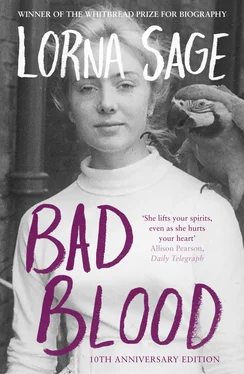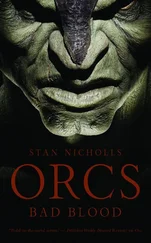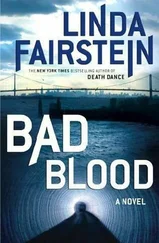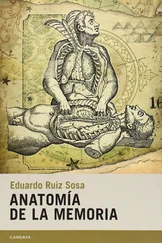Which was a hole, according to Grandma. A dead-alive dump. A muck heap. She’d shake a trembling fist at the people going past the vicarage to church each Sunday, although they probably couldn’t see her from behind the bars and dirty glass. She didn’t upset my version of pastoral. She lived in a different dimension, she said as much herself. In her world there were streets with pavements, shop windows, trams, trains, teashops and cinemas. She never went out except to visit this paradise lost, by taxi to the station in Whitchurch, then by train to Shrewsbury or Chester. This was life . Scented soap and chocolates would stand in for it the rest of the time – most of the time, in fact, since there was never any money. She’d evolved a way of living that resolutely defied her lot. He might play the vicar, she wouldn’t be the vicar’s wife. Their rooms were at opposite ends of the house and she spent much of the day in bed. She had asthma, and even the smell of him and his tobacco made her sick. She’d stay up late in the evening, alone, reading about scandals and murders in the News of the World by lamplight among the mice and silverfish in the kitchen (she’d hoard coal for the fire up in her room and sticks to relight it if necessary). She never answered the door, never saw anyone, did no housework. She cared only for her sister and her girlhood friends back in South Wales and – perhaps – for me, since I had blue eyes and blonde hair and was a girl, so just possibly belonged to her family line. She thought men and women belonged to different races and any getting together was worse than folly. The ‘old devil’, my grandfather, had talked her into marriage and the agony of bearing two children, and he should never be forgiven for it. She would quiver with rage whenever she remembered her fall. She was short (about four foot ten) and as fat and soft-fleshed as he was thin and leathery, so her theory of separate races looked quite plausible. The rhyme about Jack Sprat (‘Jack Sprat would eat no fat, / His wife would eat no lean, / And so between the two of them / They licked the platter clean’) struck me, when I learned it, as somehow about them. Looking back, I can see that she must have been a factor – along with the booze (and the womanising) – in keeping him back in the Church. She got her revenge, but at the cost of living in the muck heap herself.
Between the two of them my grandparents created an atmosphere in the vicarage so pungent and all-pervading that they accounted for everything. In fact, it wasn’t so. My mother, their daughter, was there; I only remember her, though, at the beginning, as a shy, slender wraith kneeling on the stairs with a brush and dustpan, or washing things in the scullery. They’d made her into a domestic drudge after her marriage – my father was away in the army and she had no separate life. It was she who answered the door and tried to keep up appearances, a battle long lost. She wore her fair hair in a victory roll and she was pretty but didn’t like to smile. Her front teeth were false – crowned, a bit clumsily – because in her teens, running to intervene in one of their murderous rows, she’d fallen down the stairs and snapped off her own. During these years she probably didn’t feel much like smiling anyway. She doesn’t come into the picture properly yet, nor does my father. My only early memory of him is being picked up by a man in uniform and being sick down his back. He wasn’t popular in the vicarage, although it must have been his army pay that eked out Grandfather’s exiguous stipend.
The grandparents weren’t grateful. They both felt so cheated by life, they had their histories of grievance so well worked out, that they were owed service, handouts, anything that was going. My mother and her brother they’d used as hostages in their wars and otherwise neglected, being too absorbed in each other, in their way, to spare much feeling. With me it was different: since they no longer really fought they had time on their hands and I got the best of them. Did they love me? The question is beside the point, somehow. Certainly they each spoiled me, mainly by giving me the false impression that I was entitled to attention nearly all the time. They played. They were like children, if you consider that one of the things about being a child is that you are a parasite of sorts and have to brazen it out self-righteously. I want. They were good at wanting and I shared much more common ground with them than with my mother when I was three or four years old. Also, they measured up to the magical monsters in the story books. Grandma’s idea of expressing affection to small children was to smack her lips and say, ‘You’re so sweet, I’m going to eat you all up!’ It was not difficult to believe her, either, given her passion for sugar. Or at least I believed her enough to experience a pleasant thrill of fear. She liked to pinch, too, and she sometimes spat with hatred when she ran out of words.
Domestic life in the vicarage had a Gothic flavour at odds with the house, which was a modest eighteenth-century building of mellowed brick, with low ceilings, and attics and back stairs for help we didn’t have. At the front it looked on to a small square traversed only by visitors and churchgoers. The barred kitchen window faced this way, but in no friendly fashion, and the parlour on the other side of the front door was empty and unused, so that the house was turned in on itself, against its nature. A knock at the door produced a flurry of hiding-and-tidying (my grandmother must be given time to retreat, if she was up, and I’d have my face scrubbed with a washcloth) in case the visitor was someone who’d have to be invited in and shown to the sitting-room at the back which – although a bit damp and neglected – was always ‘kept nice in case’.
If the caller was on strictly Church business, he’d be shown upstairs to Grandfather’s study, lined with bookcases in which the books all had the authors’ names and titles on their spines blacked out as a precaution against would-be borrowers who’d suddenly take a fancy to Dickens or Marie Corelli. His bedroom led off his study and was dark, under the yew tree’s shadow, and smelled like him. Across the landing was my mother’s room, where I slept too when I was small, and round a turn to the right my grandmother’s, with coal and sticks piled under the bed, redolent of Pond’s face cream, powder, scent, smelling salts and her town clothes in mothballs, along with a litter of underwear and stockings.
On this floor, too, was a stately lavatory, wallpapered in a perching peacock design, all intertwined feathers and branches you could contemplate for hours – which I did, legs dangling from the high wooden seat. When the chain was pulled the water tanks on the attic floor gurgled and sang. In the other attics there were apples laid out on newspaper on the floors, gently mummifying. It just wasn’t a spooky house, despite the suggestive cellars, and the fact that we relied on lamps and candles. All of Hanmer did that, in any case, except for farmers who had their own generators. In the kitchen the teapot sat on the hob all day and everyone ate at different times.
There was a word that belonged to the house: ‘dilapidations’. It was one of the first long words I knew, for it was repeated like a mantra. The Church charged incumbents a kind of levy for propping up its crumbling real estate and those five syllables were the key. If only Grandfather could cut down on the dilapidations there’d be a new dawn of amenity and comfort, and possibly some change left over. Leaks, dry rot, broken panes and crazy hinges (of which we had plenty) were, looked at rightly, a potential source of income. Whether he ever succeeded I don’t know. Since the word went on and on, he can’t have got more than a small rebate and no one ever plugged the leaks. What’s certain is that we were frequently penniless and there were always embarrassments about credit. Food rationing and clothes coupons must have been a godsend since they provided a cover for our indigence. As long as austerity lasted, the vicarage could maintain its shaky claims to gentility. There was virtue in shabbiness. Grandfather had his rusty cassock, Grandmother her mothballed wardrobe and my mother had one or two pre-war outfits that just about served. Underwear was yellowed and full of holes, minus elastic. Indoors, our top layers were ragged too: matted jumpers, socks and stockings laddered and in wrinkles round the ankles, safety pins galore. Outside we could pass muster, even if my overcoat was at first too big (I would grow into it), then all at once too small, without ever for a moment being the right size.
Читать дальше












